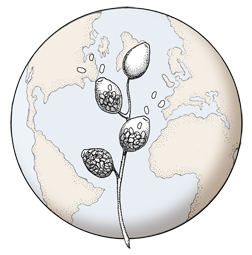Publication Type:
Journal ArticleSource:
Forest Pathology, Blackwell Publishing Ltd, Volume 42, Number 1, p.8–13 (2012)URL:
http://dx.doi.org/10.1111/j.1439-0329.2011.00715.xAbstract:
Variation in virulence was examined among isolates of Phytophthora ramorum from epidemiologically important or infectious (non-oak) and transmissive dead-end (oak) hosts from North America. Twelve isolates representative of the genetic, geographic and host range of P. ramorum in the western United States were inoculated on leaves of Umbellularia californica (bay laurel or bay) and stems of Quercus agrifolia (coast live oak). In spite of extreme genetic similarity among the isolates employed, and even within the same genotype, significant differences in lesion size were measured, suggesting virulence in this pathogen is also controlled by epigenetic factors. A strong positive correlation between lesion size on bay laurel and coast live oak provides experimental evidence P. ramorum is a generalist pathogen that lacks host specificity. Isolates from non-transmissive oaks were significantly less pathogenic both on oaks and bays than isolates from infectious hosts. These results are essential to further our understanding of the epidemiology and evolutionary potential of this pathogen. A quantitative differential in virulence of isolates from hosts with different epidemiological roles has been described for many animal diseases, but is a novel report for a plant disease.


